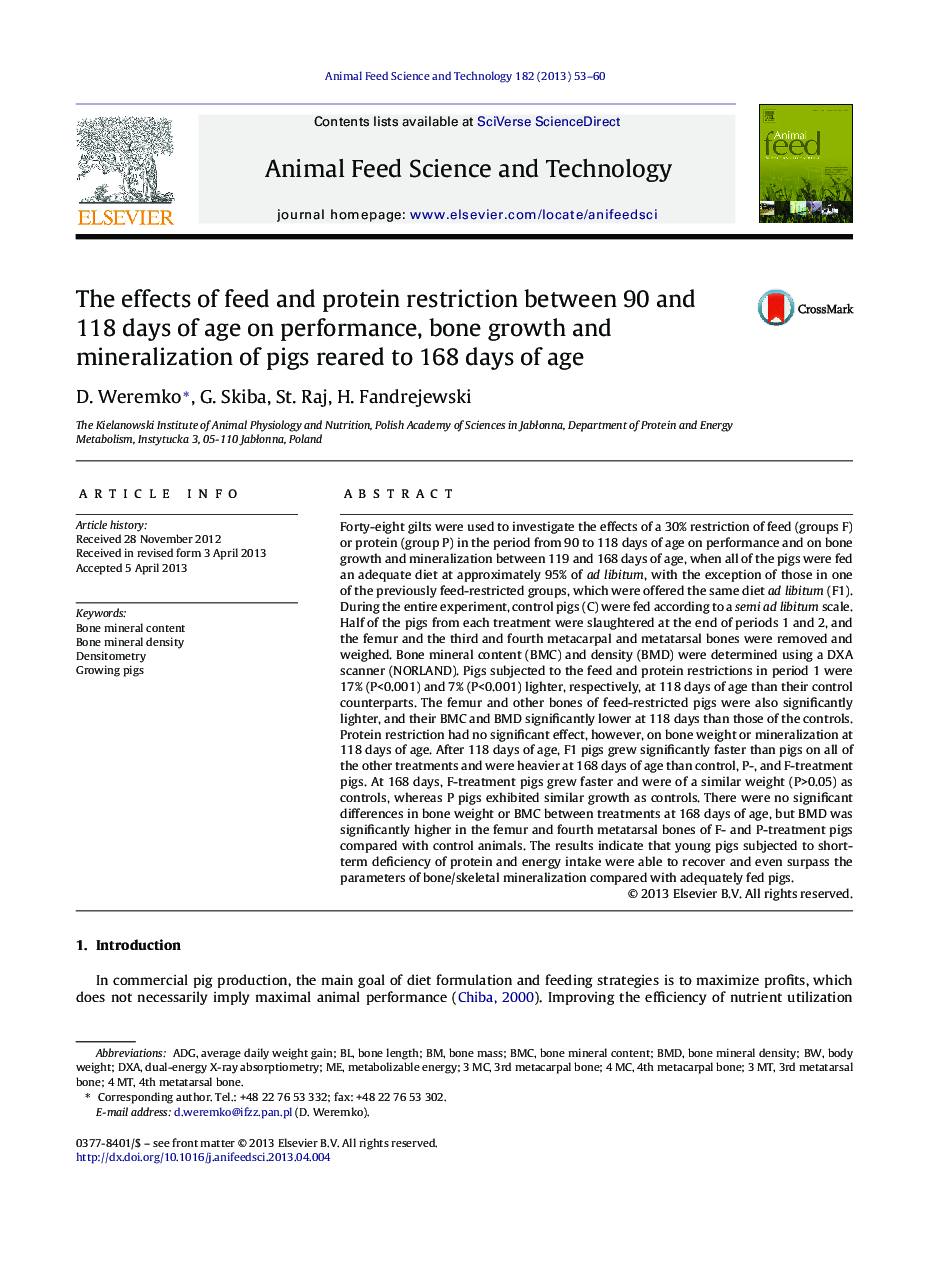| کد مقاله | کد نشریه | سال انتشار | مقاله انگلیسی | نسخه تمام متن |
|---|---|---|---|---|
| 8491898 | 1552406 | 2013 | 8 صفحه PDF | دانلود رایگان |
عنوان انگلیسی مقاله ISI
The effects of feed and protein restriction between 90 and 118 days of age on performance, bone growth and mineralization of pigs reared to 168 days of age
ترجمه فارسی عنوان
اثرات محدودیت غذا و پروتئین بین 90 تا 118 روزگی بر عملکرد، رشد استخوان و کانی سازی خوک ها تا 168 روزگی
دانلود مقاله + سفارش ترجمه
دانلود مقاله ISI انگلیسی
رایگان برای ایرانیان
کلمات کلیدی
BMCBMDDXAbone lengthADGMetabolizable energy - انرژی متابولیزه شدهBone mineral density - تراکم معدنی استخوانBone mass - توده استخوانیdual-energy X-ray absorptiometry - جذب اندازه گیری اشعه ایکس دوگانه انرژیGrowing pigs - خوک در حال رشدDensitometry - دانسیومتریaverage daily weight gain - متوسط افزایش روزانه وزنBone mineral content - محتوای مواد معدنی استخوانbody weight - وزن بدن
موضوعات مرتبط
علوم زیستی و بیوفناوری
علوم کشاورزی و بیولوژیک
علوم دامی و جانورشناسی
چکیده انگلیسی
Forty-eight gilts were used to investigate the effects of a 30% restriction of feed (groups F) or protein (group P) in the period from 90 to 118 days of age on performance and on bone growth and mineralization between 119 and 168 days of age, when all of the pigs were fed an adequate diet at approximately 95% of ad libitum, with the exception of those in one of the previously feed-restricted groups, which were offered the same diet ad libitum (F1). During the entire experiment, control pigs (C) were fed according to a semi ad libitum scale. Half of the pigs from each treatment were slaughtered at the end of periods 1 and 2, and the femur and the third and fourth metacarpal and metatarsal bones were removed and weighed. Bone mineral content (BMC) and density (BMD) were determined using a DXA scanner (NORLAND). Pigs subjected to the feed and protein restrictions in period 1 were 17% (P<0.001) and 7% (P<0.001) lighter, respectively, at 118 days of age than their control counterparts. The femur and other bones of feed-restricted pigs were also significantly lighter, and their BMC and BMD significantly lower at 118 days than those of the controls. Protein restriction had no significant effect, however, on bone weight or mineralization at 118 days of age. After 118 days of age, F1 pigs grew significantly faster than pigs on all of the other treatments and were heavier at 168 days of age than control, P-, and F-treatment pigs. At 168 days, F-treatment pigs grew faster and were of a similar weight (P>0.05) as controls, whereas P pigs exhibited similar growth as controls. There were no significant differences in bone weight or BMC between treatments at 168 days of age, but BMD was significantly higher in the femur and fourth metatarsal bones of F- and P-treatment pigs compared with control animals. The results indicate that young pigs subjected to short-term deficiency of protein and energy intake were able to recover and even surpass the parameters of bone/skeletal mineralization compared with adequately fed pigs.
ناشر
Database: Elsevier - ScienceDirect (ساینس دایرکت)
Journal: Animal Feed Science and Technology - Volume 182, Issues 1â4, 12 June 2013, Pages 53-60
Journal: Animal Feed Science and Technology - Volume 182, Issues 1â4, 12 June 2013, Pages 53-60
نویسندگان
D. Weremko, G. Skiba, St. Raj, H. Fandrejewski,
